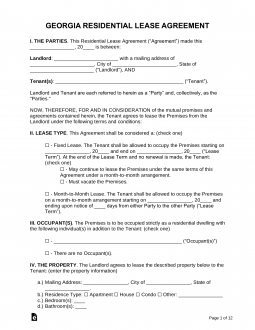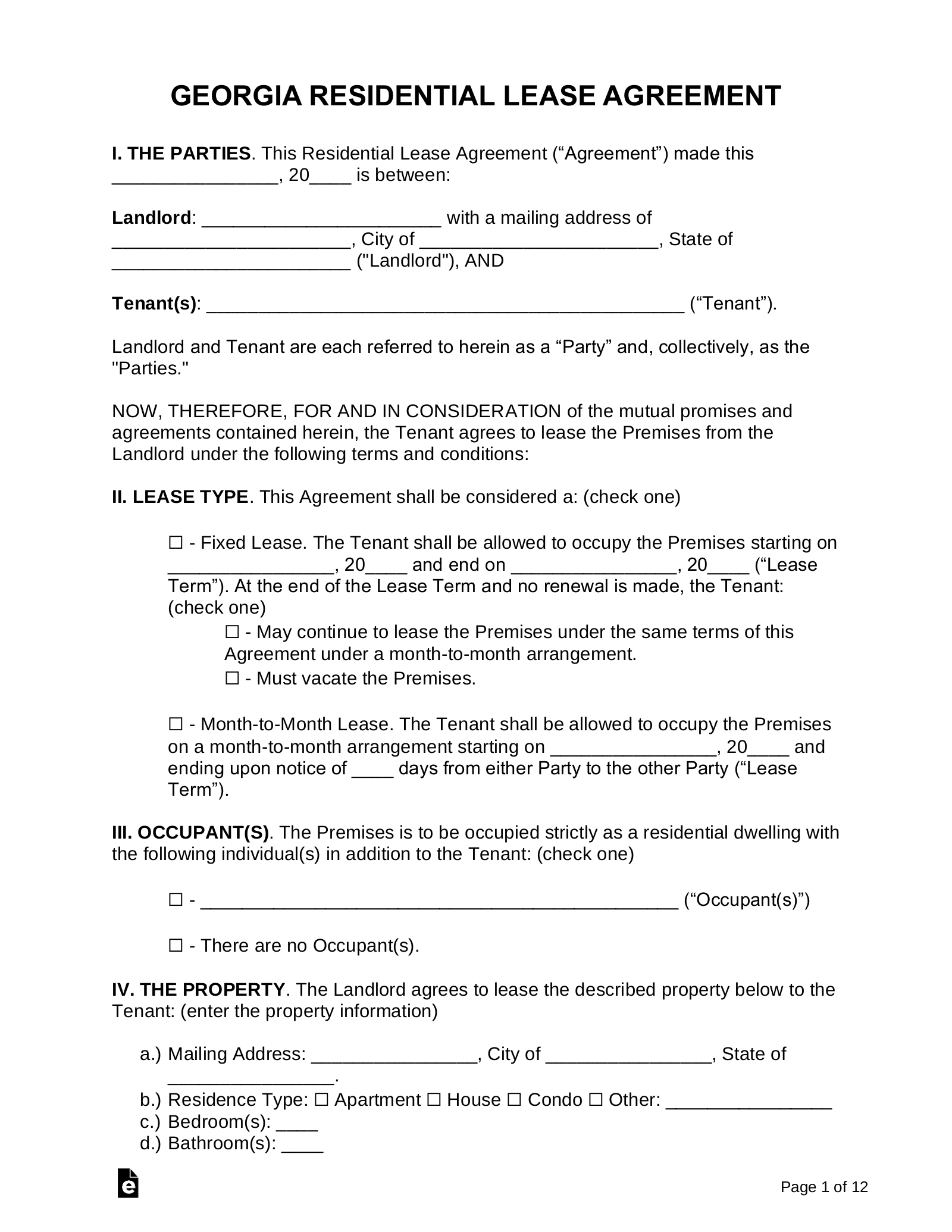Updated November 20, 2023
A Georgia lease agreement is a property rental contract between a landlord and a tenant. The responsibilities of utilities and services to the property are negotiated between the parties and outlined in the agreement. The landlord, prior to signing, will typically verify the tenant’s credit and employment through a rental application. After approving the tenant’s financials, a lease will be written and signed with the tenant required to pay the first month’s rent and security deposit (if any) before move-in.
Table of Contents |
Agreement Types (7)
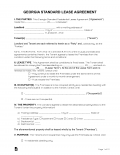 Standard Residential Lease Agreement – Fixed-term version for residential tenancies provided by the Department of Community Affairs (DCA). Standard Residential Lease Agreement – Fixed-term version for residential tenancies provided by the Department of Community Affairs (DCA).
Download: PDF, MS Word, OpenDocument |
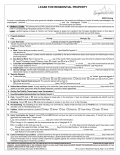 Association of Realtors Agreement – Provided by the Georgia Association of Realtors for residential tenancies. Association of Realtors Agreement – Provided by the Georgia Association of Realtors for residential tenancies.
Download: PDF |
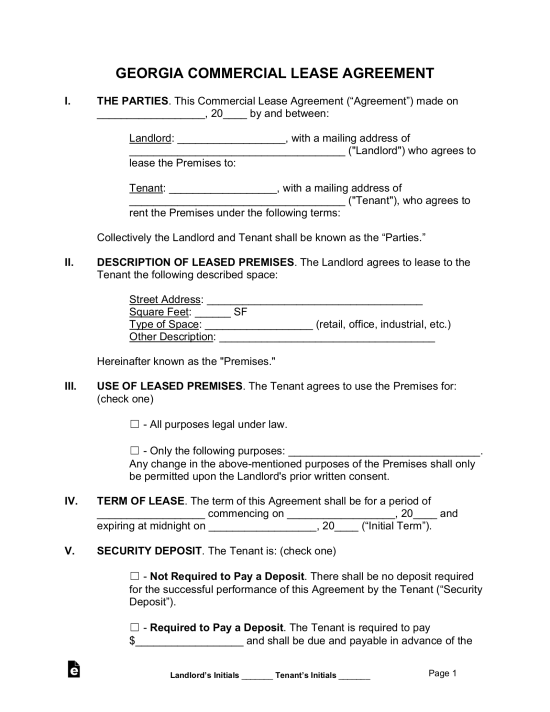 Commercial Lease Agreement – For any type of business-related space, including retail, office, industrial, and storage. Commercial Lease Agreement – For any type of business-related space, including retail, office, industrial, and storage.
Download: PDF, MS Word, OpenDocument |
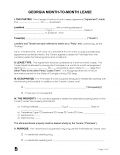 Month-to-Month Lease Agreement – Known as a “tenancy at will.” The agreement has no end date but may be canceled with a termination letter. Month-to-Month Lease Agreement – Known as a “tenancy at will.” The agreement has no end date but may be canceled with a termination letter.
Download: PDF, MS Word, OpenDocument |
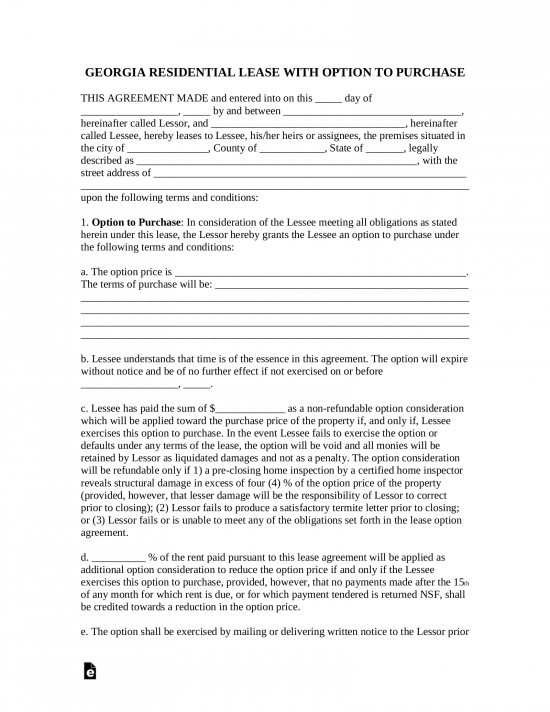 Rent-to-Own Lease Agreement – A typical fixed-term contract that includes a provision to allow for the sale of the property. Rent-to-Own Lease Agreement – A typical fixed-term contract that includes a provision to allow for the sale of the property.
Download: PDF, MS Word, Open Document |
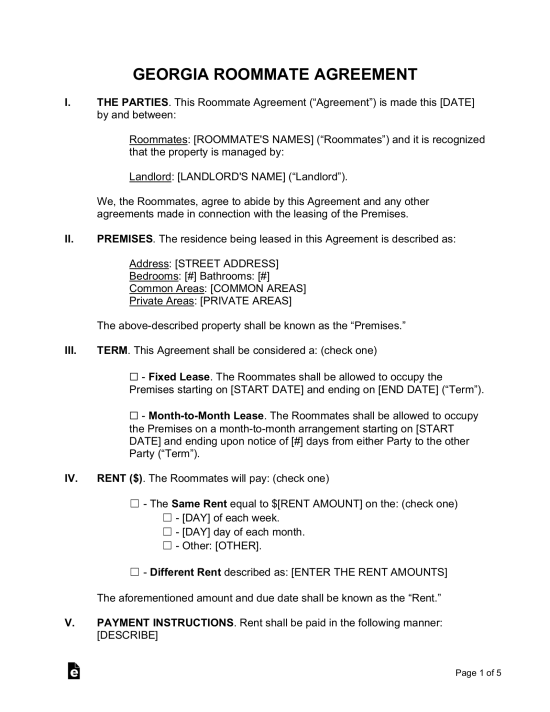 Room Rental (Roommate) Agreement – To come to terms with others that share the same living space within a residence. Room Rental (Roommate) Agreement – To come to terms with others that share the same living space within a residence.
Download: PDF, MS Word, OpenDocument |
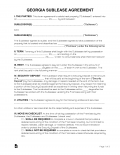 Sublease Agreement – Between the tenant and a sub-lessee for the use of the property until the end of the tenant’s rental term or any other period as agreed by the parties. Typically the landlord’s consent is required. Sublease Agreement – Between the tenant and a sub-lessee for the use of the property until the end of the tenant’s rental term or any other period as agreed by the parties. Typically the landlord’s consent is required.
Download: PDF, MS Word, OpenDocument |
Required Disclosures (4)
- Identification – The lease must include a person of contact, including their name and address.[1]
- Move-in / Move-out Inspection Form – Before collecting the security deposit, the landlord must list all prior damage on the premises.[2]
- Lead-Based Paint Disclosure – Per federal law, if the residential dwelling was built prior to 1978, this document must be attached to the rental contract.
- Flood Disclosure – (conditional) – If there has been flooding three or more times in the last five years, the tenant must be notified prior to move-in.[3]
Security Deposits
Maximum Amount – No statutory limit. The landlord may request as much as desired.
Separate Bank Account – The security deposit must be held in an escrow account exclusively for that purpose.[4]
Returning to Tenant – The landlord must give the deposit back to the tenant within thirty (30) days of the termination date.[5]
- Itemized List – If the landlord seeks to make deductions from the security deposit to cover damage to the property, they must provide an itemized list detailing the deductions along with the remainder of the deposit.
When is Rent Due?
Grace Period – Rent is due on the date mentioned in the lease. Georgia does not have a grace period for tenants. If rent is late, the landlord can begin eviction proceedings by sending the tenant an immediate notice to pay or quit.
Maximum Late Fee (None) – There is no statutory limit for fees charged on late rent as written in a lease agreement. However, the law specifies that the landlord can charge interest on the owed rent. The maximum interest rate (usury rate) is 16% per annum.[6]
NSF Fee – The maximum fee for a bad check is $30 or 5% of the check amount, whichever is greater.[7]
Withholding Rent – The landlord is obligated to keep the property in good repair.[8] However, the law does not provide tenants the right to withhold rent for outstanding repairs or damage.
Right to Enter (Landlord)
Abandonment
Breaking the Lease – Tenants have the duty to continue paying rent if they end the lease early. The landlord does not have to re-rent the unit.[9] However, tenants may in some cases terminate leases without penalty pursuant to military or court orders.[10][11]
Unclaimed Property – Georgia law does not address personal property left behind by tenants at the end of a lease. The procedure for dealing with abandoned property is within the landlord’s discretion.

